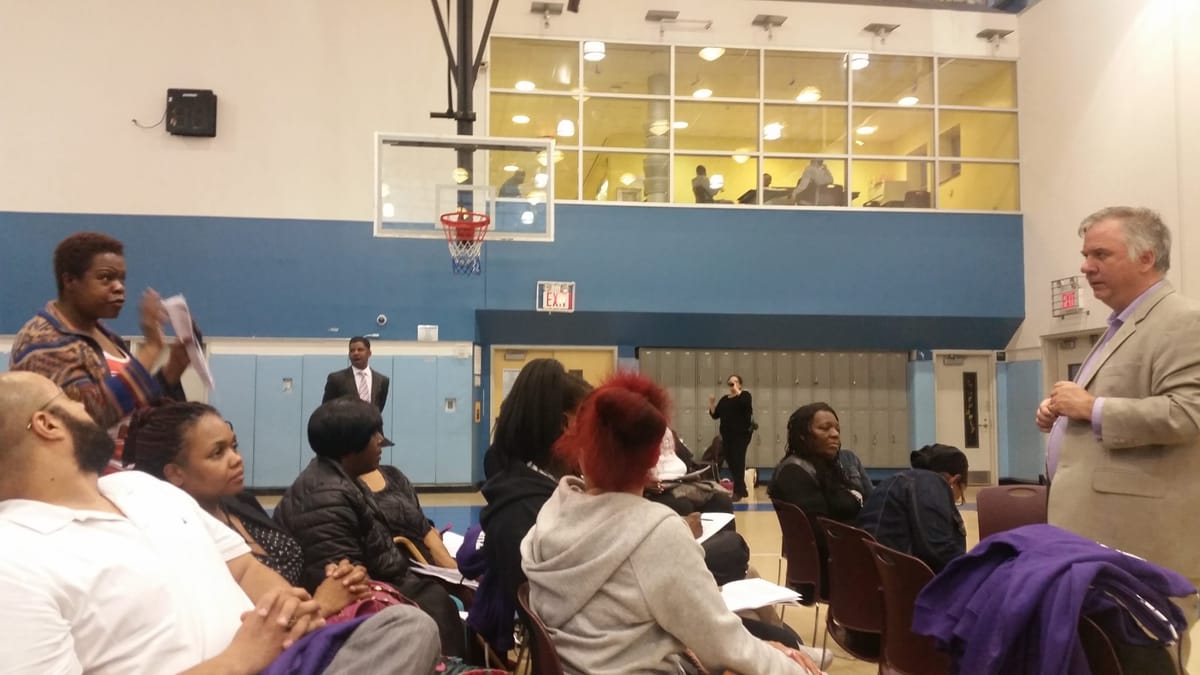What NYCHA Residents Need To Know About Downsizing In The Community


Dozens of Fort Greene residents — many of them seniors — came out to a community information session/town hall to pepper the New York City Housing Authority (NYCHA) representative with questions and impassioned testimonials about the impact of downsizing on their lives.
“How do we make sure we aren’t taken advantage of?” “What options do we have if we don’t like what you offer?” “What if I can’t physically move out?”
These and more questions were addressed by NYCHA representative Brian Honan and Dominique Bryant of Councilmember Laurie Cumbo’s office, which co-sponsored the event along with Congressmember Hakeem Jeffries, Assemblymember Walter Mosley, and State Senator Velmanette Montgomery on May 18.
First, some background: downsizing is the practice of forcing existing residents, usually seniors, of NYCHA public housing to move into smaller apartments once their families grow up and move away, in order to make room for new residents and families who are currently on waiting lists. The practice is not particularly new, but it has been updated to reflect some new policy changes meant to address safety and other concerns from senior citizens and their families.
“They’re asking people with three-bedrooms to downsize to one-bedrooms if they’re single,” explained Edith Tucker, secretary of the Ingersoll Community Garden. “I don’t mind downsizing, but I want my living room and kitchen separate. Over the years you accumulate things that mean a lot. And I need to be in an area that is safe for seniors, with friends.”
“They say you can’t refuse if you don’t want it, but I should have the right to refuse,” added fellow Ingersoll resident of over 45 years, Ray Bilal. “They want to move me across the bridge, but I want to stay here. And meanwhile, people there are being moved here. It makes no sense. I want to be with people I know, seniors. We’re not asking for very much.”
Dominique Bryant, from Cumbo’s office, explained that “the problem residents have isn’t downsizing, but the approach of NYCHA saying if you don’t accept this, the termination process begins. We want residents to know their rights, how to respond, and what the actual policy is.”
In an effort to appease seniors’ concerns, NYCHA’s Honan explained the differences between the old and new downsizing policies.
Under the old policy, he said, there was no education about what the policy was or what the process entails. if you are one person in a two-bedroom unit, then you only receive one letter notifying you of downsizing; if you didn’t respond within the allotted time, then you would be moved to a transfer list. But if you have more than two-bedrooms, you would get three letters of notification before being put on an in-house transfer list (for example, Ingersoll-only, or Whitman-only) — and then a borowide transfer list. If you don’t like NYCHA’s choice of apartment for you, then you get evicted.
The new policy has two “major changes,” said Honan: (1) if you ignore the third notification letter, you only get put on an intra-development list, instead of being moved to somewhere completely across the borough, away from family and friends; (2) an expanded “reasonable accommodations” list that includes illness and disability notes — such as requiring a room for an in-home health aide — from your doctor as grounds for waiving NYCHA’s attempt to move you.
New notification letters, noting the opt-out process for reasonable accommodations will be unveiled this summer. New languages will also “be considered once the process starts.”
“For a long time, NYCHA has not handled this in a sensitive way that takes feelings and needs into consideration,” Honan admitted. “It’s a scary process as in New York City, it’s not uncommon to live in an apartment for over 20 years — they’re homes, not apartments. [But[ housing is too much of a commodity to end downsizing. So we can move [residents] with dignity and work to keep communities strong.”
Another upcoming change will be to NYCHA’s rent-collection method so that tenants will be able to tell NYCHA what day works for them to have their rent automatically deducted out of their account — instead of having rent dates on the 1st of the month conflict with Social Security checks that don’t arrive until later in the month.
If you have questions about your own situation, contact Dominique Bryant at Councilmember Cumbo’s office at 718-260-9191, extension 4, or by email at dbryant@council.nyc.gov.




